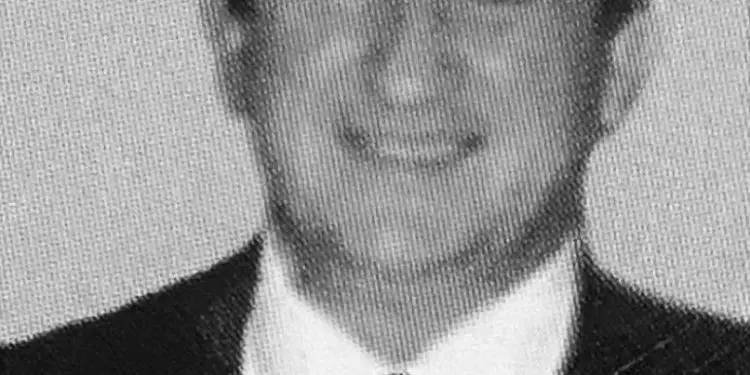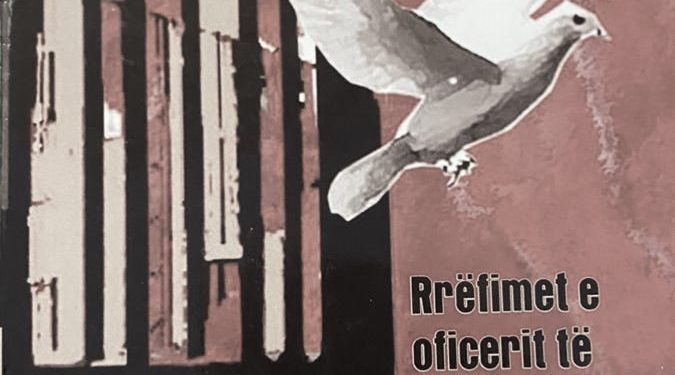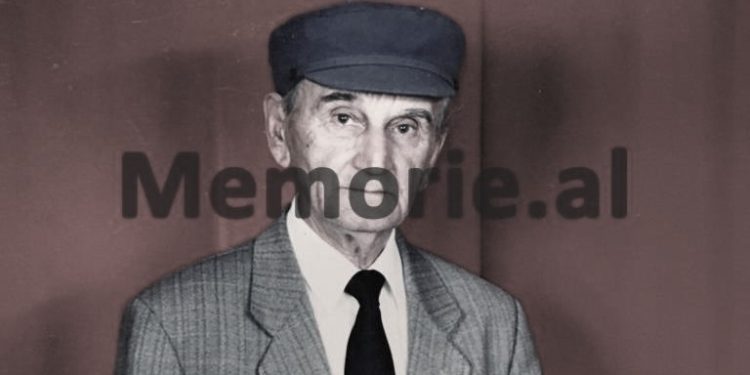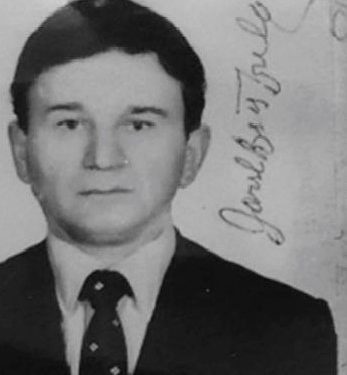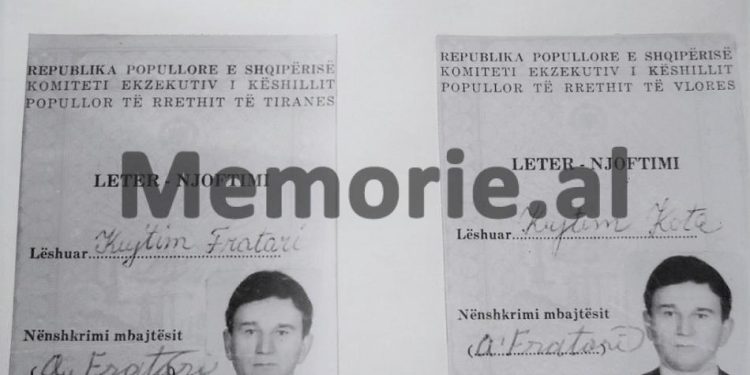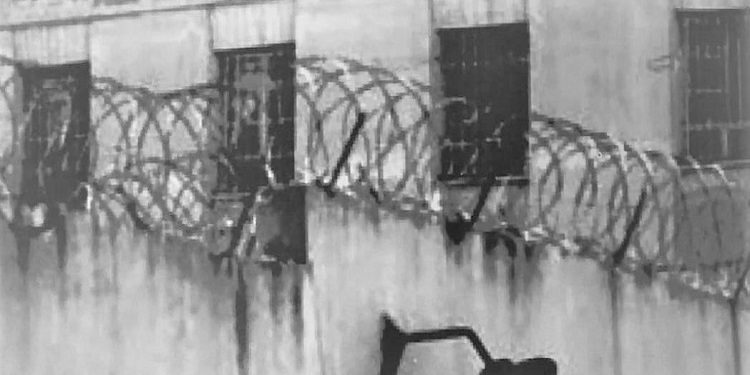By Afrim Imaj
The first part
Memorie.al / “I, the Security Operative of the Burrel Prison, who coexisted with the ‘enemies of the people'”! However, I will try to make this statement; “to respect” in its essence. I say in its essence, that the forms used by the State Security, such as: the secret network, operational techniques, surveillance, postal control and others, have already appeared in the market. In my stories, I will try to be accurate. To be as truthful as possible, I am obliged to mention concrete names, but never those that should remain a secret. I have decided to take these with me to the grave. After finishing the School of the Ministry of the Interior, I started working with the image that they had created for us as “enemies of the class and the motherland”. I did not encounter this image in practice as it was preached to us, and gradually in my consciousness, it began to fade. A powerful influence, in changing the concept created in me about the class enemy, has played “coexistence”, with the convicts of the prison of Burrell, for many years in a row.
Security officer, in Burrel prison
I arrived in Burrel on October 24, 1978. On that day, a team from the Ministry, which had been there for help and control, gave the conclusions. The deputy minister, Feçor Shehu, was also there. After the meeting, he called me to the office of the head of the Branch and informed me of the appointment, as; Operative worker in Burrel prison. He ordered me to be careful, after that; “anti-party elements, the fiercest enemies of the party and the motherland, suffer punishment”. Although I had moved from Gjirokastra, to “alleviate the class war”, the ideology of the time had formed the belief in me too, that this category of people were really dangerous. The first convict I met in Burrel prison was Koço Tashko. I was entering the prison premises for the first time, when I confronted him.
His son, Fredi Tashko, had come to meet him. Koço was over 80 and could barely stand. The first contact with him made something “jump” in my formation. Koço’s age and miserable physical condition make me wonder: “This is the dangerous enemy”?! Everything I experienced on the first day, but also what I saw later, had a significant impact on my formation. These circumstances formed a different opinion in me, about many of the convicts of Burrell. After some time, Koçua finished his sentence and was exiled to the Adriatic village of Kruja, although in a serious physical condition. I couldn’t understand this logic! I also found the convicts in prison: Xhavit Qesja, Maqo Çomo, Fadil Paçrami, Todi Lubonja, Vaskë Gjino, Lipe Nashi, Kiço Ngjela, Gjin Marku and many others.
In addition to the task of studying their files, I was driven by curiosity to get to know the details of the activity for which they were convicted. In most files, I had a hard time finding the necessary elements of the crime they were charged with. However, I did not have the courage to talk about this phenomenon. From the first days, I was particularly impressed by the strong character of the convicts; Xhavit Qesja, Maqo Çomo, Bardhyl Belishova, Kurt Kola, Daut Gumeni, Spartak Ngjela, etc. It is unbelievable that the latter was serving his sentence in the same prison as his father, Kiço Njjela, if they were not allowed to meet. In 1984, the young convicts who were beaten after the suicide of Mehmet Shehu, Muhamet Prodani, Mihallaq Ziçishti, Abaz Fejzon, Halim Ramohiton, Arif Hasko, Rahman Parllaku, Nesti Nasen, Duro Shehu, Ali Çenon, were brought to the Burrel prison in 1984. Xhavit Ismailaga and Mehmet’s two sons, Skënder and Bashkim Shehu.
Many of these had told the investigator details about Mehmet Shehu’s group. When I read them, I thought that we were really dealing with real enemies of the party and the government. But during the work for the more in-depth discovery of the extent of this activity, I did not find many of the facts that were in the files. In one case, I asked Ali Çeno to talk to me in more detail about what he had deposited with the investigator. He burst into tears and told me: “Don’t believe them! In the conditions in which I happened, I was forced to accept things that are not true”! In the same way, it happened to me with Mihallaq Ziçishti, who knew the working methods of the Security, as he had been the Deputy Minister of Internal Affairs for years…!
When Enver died
Those were the moments when Enver’s death was announced. All the rooms of the anti-party convicts were equipped with the means of operative technique (wiretapping) and I, from the office to the prison, had the duty to follow their reactions, in the specific case of Enver’s death. Some of them experienced it with pain and expressed this in different ways. Even though they were serving sentences for several years, most of them gave positive considerations to Enver. “Now Albania will be taken by the river”, reacted one. “Now the Albanian people are saved”! Abaz Fejzo replied, raising his voice. All these, but also many others, made me change my opinion about convicts in general, and in particular, about anti-party convicts. A good part of them, for me, were already imaginary enemies. Even many of the other convicts were not the ones I had imagined before. In this view, working in prison was also a fate for me. There I really found the truth.
I was lucky to be part of the working group, for the application of two amnesties in the Burrel prison, those of 1982 and 1986. In both cases, ordinary convicts, who had served half of their sentences, were forgiven. Those who were convicted for agitation and propaganda, or tendency to escape, were pardoned if they were in the last year of their sentence. Ordinary convicts were mainly those who had been punished for theft, robbery, murder, etc. It was these people who benefited from those who were political convicts. That was the logic of that system. I had nothing to say to the convicts when they asked me to explain such an attitude.
The re-sentencing of Costa Fili
Costa Fili was serving his sentence in Burrell prison. He, in 1953, escaped to Greece, from his village, Mursi. Settled in the city of Igoumenica, where he got married and raised a family, after a few years, he made several attempts to enter Albania illegally, to take his mother with him, but he could not do it. In a subsequent attempt in 1957, he fell into the trap of the Security and was captured. A little later, he was arrested as an agent of the Greek Intelligence and the liaison of Teme Sejko’s group. He was sentenced to 25 years in prison. In 1979, his sentence ended. Two or three months before the release date, Kosta Fili sent a letter to the Prime Minister. He told him why he had been arrested and was finishing his sentence.
In conclusion, he asked him to go and spend the rest of his life in Greece with his family. It was this letter that set the Ministry of the Interior in motion. Kosta Fili, who occupied an important place in the Museum of the Ministry of the Interior, as a dangerous saboteur, entered the ranks of “VIP” convicts. From above, the order was given to work on the collection of data proving his hostile activity and to prepare the documents to re-sentence him. It was difficult to gather such evidence. Meanwhile, the day of release was approaching. Although the evidence was missing, it was fabricated and the representatives of the center were optimistic about the approval of the arrest proposal by the District Prosecutor’s Office.
The approval of those who were in the conditions of serving the sentence was the competence of the District Prosecutor’s Office. However, when the person proposed for arrest was free, the signature of the General Prosecutor was necessarily required. In the newly completed file, there were data from the years ’58-’60s, when he was isolated in the prison of Gjirokastra. With his roommates, he expressed that; wherever he is serving his sentence, he would create the opportunity to escape. This information was used for the new charge. Two former accomplices of that time, now freed, provided the “evidence” that was used to hit Phil. So, about conversations that took place 20 years ago.
The day of release came. The next day, at 8 o’clock, the prison commander, Idajet Deda, gave the order to proceed with his release. Kosta went to the prison records, where all the necessary actions were taken. He was also provided with a certificate, which he would use in the finances of the Interior Department, to withdraw the income he had in his account. He threw the bag on his back and went to Dega. He was now a free citizen. In the meantime, the Prosecutor’s Office had been set in motion and had signed the arrest. Now that Kosta was free, the arrest by order of the district attorney was illegal. Kosta, who saw himself free after 28 years, had no strength to react. His mind, after so many years in prison, was only thinking about going to Greece, near his family. He was well aware of the re-sentencing practices that many fellow prisoners had followed. He had suffered this fate; Maqo Çomo, Gjin Marku, Kapllan Resuli, Bardhyl Belishova and others…!
The Head of the Branch ordered me to take Kosta Fili, who was in finance, and take him to his office. There was no other way but to obey him. “Kosta, you were released today, but from the Prosecutor’s Office, an arrest warrant has arrived for you”, announced the mayor and presented him with the approved arrest decision…! The closing of the investigations and the trial of Kosta Fili were carried out in a flash. He was re-sentenced for another 10 years. After a few days, he returned to his old prison cell to serve his sentence. With Kosta, I used to talk in Greek from time to time. The only request he made of me was to write a letter for the family, out of turn. I couldn’t help but fill it. In the letters he received from Greece and America, he often found checks in the value of dollars.
It was my duty to perform the operations in the bank and convert them into lek, which I then transferred to Fili’s account. The conversion was done with 20 old ALL for one dollar. His aunt’s son from the USA, Jani Hito, often sent dollars to Kosta. They had escaped together from Albania in 1953. While Jani immediately went to America, Kosta had the above story. In 1987, Kosta told me that his son-in-law in Ioannina, K. Dinaleksi, was an acquaintance of the deputy of Ioannina, Papoulas, and Minister of Foreign Affairs of Greece. He was interested in Papulas, to intervene with the Albanian authorities, to forgive him part of the sentence.
And it had an effect. Papulas, at that time he came to visit Albania. Immediately after that, a letter came to the prison of Burrell, where it was said that; The Presidium of the People’s Assembly asked for the opinion on pardoning the remaining sentence of the prisoner Kosta Fili. A month later, Kosta was released. I met him at Burrell Tourism. He asked me to help him to contact his daughter by phone in Ioannina. It had been 28 years since he had been separated from her and he would hear her voice for the first time. I helped him and the connection was done instantly. I lived very touching moments, when I saw Kosta, a pretty man, crying like a child and kissing the receiver like crazy…!
“How did I become friends with the man who would kill Enver…”?!
The first confrontation with Avdul Banushi took place in his cell. Then, I met with him, from time to time. Now I had my “my” man before my eyes every day. A few days later, the letter arrived, where orders were given, that he should serve his sentence under the conditions of complete conspiracy and not meet with the other convicts. He was isolated in the dungeon, with the convict Sh.N., former aviation officer, to avoid the risk of any possible suicide. Since Avduli wore a white hat, the prison guards called him by the nickname “kasketa”. In Avdul’s file, there were a lot of interesting data. He continued to be pursued in active processing, although the process of his investigation and sentencing had ended.
During the trial, Avduli had not revealed anything about the foundations of the organization in Albania. Exactly, this was already the main objective of its processing. I studied the processing file and the investigative file in one breath. I evidenced the conclusion that; I was dealing with a subject, a determined opponent of the communist regime, a courageous type, fearless in the face of difficulties. He openly expressed national feelings, as well as longing for his homeland. He considered me as a fellow countryman and wanted us to talk. As for the love for relatives, he kept it inside himself and did not show it. Appreciated the kindness and felt the obligation to reward it. However, he remained one of the most dangerous people in power…!
The story of Avdul Banushi
The name of Avdul Banushi had become a legend for the State Security in the years 1972-1974. Operational data confirmed his engagement as the main exponent of the “Albanian Anti-Communist Resistance Front” (FRASH) and the failed attempt of this organization, in 1974, to sabotage the military parade in Tirana, on the occasion of the 30th anniversary of liberation. According to the secret document, this organization had planned the placement of explosives in the parade tribune where the state leadership would stand, or a direct strike from a FRASH base in one of the palaces of Shallvarev. For Avdul, who, based on the information, turned out to be in charge of these actions, the profile of a mythic man, sadist, criminal, murderer was created. What was his biography actually?
Avdul Banushi was born in Golem, Gjirokastra. In the years 1943-1944, he was included in the guerrilla units of the city of Durrës, where he was captured by the Germans and interned in Mauthausen. In 1946, after the capitulation of Germany, he was free and underwent procedures to return to his homeland. On the way back, he settled for a while, in a refugee camp, in Regio-Emilia, Italy. There he came into contact with an American officer, of Albanian origin, who “showed interest”, in him and connected him with the leaders of Albanian politics in exile, who fled on the eve and after the liberation of the country, such as: Abaz Ermenji, Abaz Kupi, Hasan Dosti, etc. During the relations that were established, Avduli fell under their influence.
They instructed him, after returning to Albania, to meet with some of their connections. Among other things, they gave him a letter about Lahe Nuron, from the villages of the Vlora district, an opponent of the system. This was hidden inside the country. The Information organs, later the State Security organs, which had spread the nets in these camps, were immediately informed about Avdul’s mission. As soon as he got off the plane in Laprakë, during the check, the letter in question was seized. For this, he was convicted and sent to a labor camp in Tirana. He was released from there in 1957. Then, he started working as a designer in the city of Patos. One winter day in 1960, they escorted him to the Fier Internal Affairs Branch for verification, leaving him to spend the night in the escort room, from where he was able to escape.
He first arrived in Greece. From there it passed through the filters of American Intelligence, which verified Avdul’s position and approved his request to go to America. Stabilized with work and residence in New York. There he met with the leaders of political emigration: Vasil Gërmenji, Hasan Dosti, Halim Begeja, Rexhep Krasniqi, etc. Their disagreement left a bad impression on Avduli. During the time I stayed with him in prison, as if by chance, I was holding Nasho Jorgaq’s book, “Mërgata e qyqeve” in my hand. Avduli didn’t stay without asking me what it was about. I told him that it was dedicated to an Albanian agent, who operated in the emigration ranks, mainly in the Court of King Zog. He had heard about it and asked to read it. After reading it, he told me: “The author has truthfully described the state of Albanian immigration in the world. The title ‘Cuckoo Migration’ is very suitable for their story”.
In 1972, with the creation of FRASH in America, Avdul Banushi was elected its general secretary, while Vasil Gërmenji was elected president and Stavri Skëndi was elected deputy. FRASH was in contact with CIA officer John. S. Its members included Sabaudin Haznedari, who in October 1982 came to Albania with Xhevdet Mustafa’s group. It had important bases in Europe, such as Subadie Koka in Milan-Italy, Lefter Guveli and Nikolla Plasoti, in Greece, etc. Subadie Koka, originally from the village of Avdul, was adopted by an Italian couple in 1943. After liberation, she, together with her adoptive parents, settled in Milan. Until 1975, FRASH acted very actively and sent several groups led by Avdul Banushi on a mission to Europe.
They committed acts of terror in the Albanian embassies in Paris, Rome, Madrid and elsewhere. Also, they continuously tried to enter Albania, to act with the main objective, terror against the leadership of the state and placing explosives in the National Security Service and the Chinese Embassy. In November 1974, a group headed by Avdul Banushi tried to enter Albania, having the main task of placing explosives in the parade stand, organized on the occasion of the 30th anniversary of the liberation, as well as blowing up the ATSH- of the Chinese Embassy in Tirana. A special contribution to the capture of Avdul was given by the agent of the Security, “Malesori”. He penetrated the ranks of FRASH in America and won its trust, to such an extent that he was designated as one of the main participants of the group that went illegally to Albania.
Of great value was the contribution of our agent’s wife, Prenda, who kept in constant contact with our agent, via phone, all the time the group wandered through Greece and Yugoslavia, to find the right moment to cross the border. of Albania. In Ioannina, Avduli told “Malesori” to have the last conversation with the woman in America, because after that, they would enter the territory of Albania, without telling her in which direction they would cross the border. At the right moment, his wife informed the State Security. Border alert was set. Since they were in Ioannina, the main forces were placed in the district of Gjirokastra, Saranda and Përmet. But Avduli decided not to enter Albania from the border with Greece, as he suspected that the Security forces were waiting for him there. At the last moment, the border crossing plan changed.
The “mountaineer” was surprised, but he had no chance to inform yet. They went to Thessaloniki by bus and from there they went to Skopje. There they took the train and went to Montenegro. They slept that evening at the agent’s house, in a village near the border, and planned to enter Albanian land late at night. The State Security had no knowledge of all these movements, because Avduli did not let our agent talk to his wife, the only channel from which the route of their movements could be learned. But, although the main security forces were deployed on the border with Greece, readiness was established along the entire border of the Albanian state. Precisely, this led to the success of the action to capture Avdul. In this situation, Prenda was ordered to sever all ties with her and her husband’s acquaintances, from the ranks of the political emigration in America, and leave immediately to Montenegro. From Montenegro, she would cross the border to Albania. Everything went according to plan.
No more than two days had passed since Avduli had been captured, when the accomplice’s wife was brought to face them. He was surprised and then he would always tell me that he couldn’t understand how he managed to believe so much in those who led him into this trap?! “I would never have believed it, if they had told me before, that Sigurimi would penetrate to this point”, he said thoughtfully, every time they discussed his adventure. Avduli, who had his own principle of “suspect anyone”, not only did not show his “friend” the direction where they would cross the border, nor did he show him any of the bases where they would rely in Albania, but he also sabotaged his personal weapon, removing the needle. These bases could not be identified even during the investigation, despite the intensive investigation, with the application of all forms, even that of physical coercion. In the trial, he was sentenced to death, a sentence which the People’s Assembly of Albania changed to 25 years of imprisonment. Memorie.al
The next issue follows




